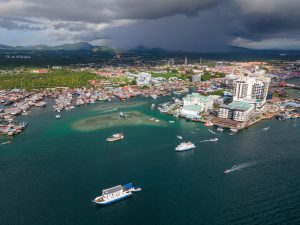Malaysia’s government plans to protest the Philippines’ passage of two new maritime laws, which it says touch upon a long-standing dispute between the two countries, the country’s deputy foreign minister said yesterday.
Speaking in Parliament, Mohamad Alamin said the government had reviewed the reference documents related to the new Philippines legislation and found that it encroaches on the eastern Malaysian state of Sabah, which borders the South China Sea, Reuters reported.
Last week, President Ferdinand Marcos Jr. signed the Philippine Archipelagic Sea Lanes Act and Philippine Maritime Zones Act into law in a nationally televised ceremony. He said that its purpose was to “improve our capacity for governance and reinforce our maritime policies for economic development and for national security,” in the face of growing Chinese aggression in Philippine-claimed waters.
“We’ve finalized and reviewed key issues in our protest note, which we’ll send today to affirm our commitment to protecting Sabah’s sovereignty and rights,” Alamin said, as quoted by BenarNews. Alamin said that the two Philippine laws apply to areas that encroach on the boundaries on the map of Malaysia’s sea territory published in 1979, which remains the reference point of the country’s maritime claims.
Kuala Lumpur regards these claims as internationally recognized and in conformity with the United Nations Convention on the Law of the Sea, but the Philippines has never relinquished its claim to Sabah, the former British crown colony of North Borneo, which joined the Malaysian Federation in 1963.
Manila staked a formal claim to the territories in 1962, on the grounds that they once fell under the control of the defunct Sultanate of Sulu, whose rule at one stage in the nineteenth century covered eastern Sabah and the southern fringes of the Philippines. Manila’s legal argument hinged on the claim that heirs of Jamalul Kiram II, the last sultan of Sulu, had formally transferred sovereignty over the territory of the former sultanate to the Philippines.
After Sabah joined Malaysia in 1963, the Philippines broke off diplomatic relations with Kuala Lumpur, and President Ferdinand E. Marcos prepared plans to invade and take back the region in the late 1960s. The Sabah dispute has remained a perpetual irritant in bilateral relations ever since, surfacing periodically, often in response to domestic political conditions in the two nations.
It was also the inspiration for the invasion in 2013 of eastern Sabah by more than 235 armed militants from the southern Philippines, led by the self-styled Sultan Jamalul Kiram III, who claimed to be an heir of the last Sulu sultan. The ensuing fight with Malaysian security forces left more than 50 gunmen and some 10 Malaysian police officers dead.
In recent years, the two nations’ efforts to assert their maritime claims in the South China Sea, where they have overlapping claims both with each other and with China and Vietnam, have invariably reactivated the Sabah question. In late 2019, Malaysia made a submission to the United Nations Commission on the Limits of the Continental Shelf extending its continental shelf off the northernmost point of Malaysian Borneo. While this was a response to growing Chinese assertiveness in the South China Sea, the Philippines later complained to the U.N. Commission that Malaysia was projecting its claim from parts of North Borneo “over which the Republic of the Philippines has never relinquished its sovereignty.”
Sabah has also been the subject of a bizarre legal claim by heirs of Jamalul Kiram II, who in 2022 secured a French court ruling ordering the Malaysian government to pay nearly $15 billion to the heirs, to honor a deal that the sultan of Sulu signed in 1878 with a British trading company over the use of his territory in Sabah. In mid-2023, a Paris court upheld the Malaysian government’s challenge against enforcing the partial award. France’s Cour de Cassation last week confirmed the decision, ruling that the award was inapplicable and void.
While the clash speaks to the welter of unresolved maritime disputes in and around the South China Sea, and the potential for bilateral friction, there is no reason to expect the current controversy will be anything more than an irritant. As Shahriman Lockman of the Institute of Strategic and International Studies in Kuala Lumpur told BenarNews, “Unless Manila actively pursues its legal claims, I don’t see a high risk of confrontation with Malaysia.”
China has also protested the passage of the Philippine laws, saying that it “illegally includes” areas claimed by China and called on the Philippines “to effectively respect China’s territorial sovereignty and maritime rights and interests.”

































